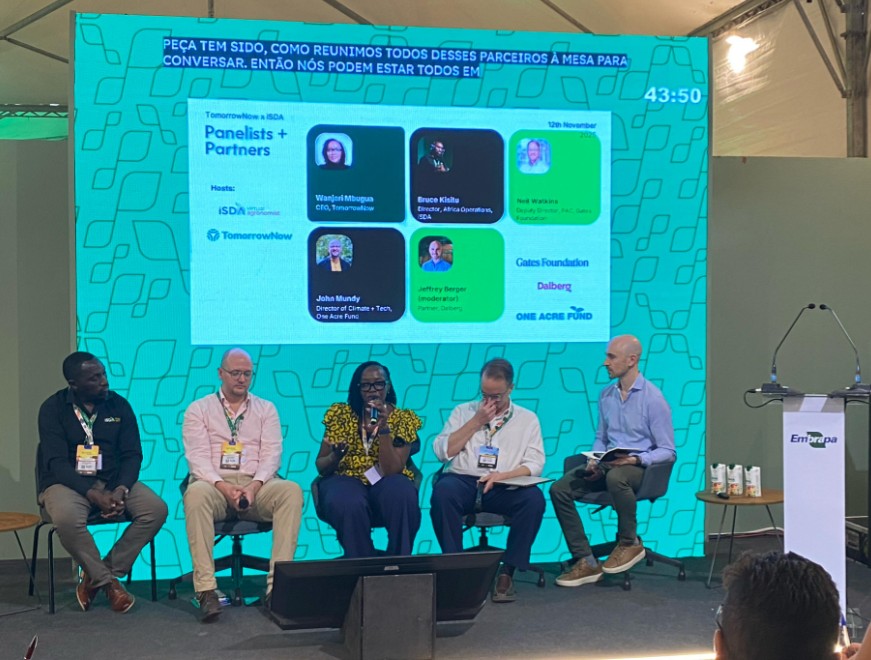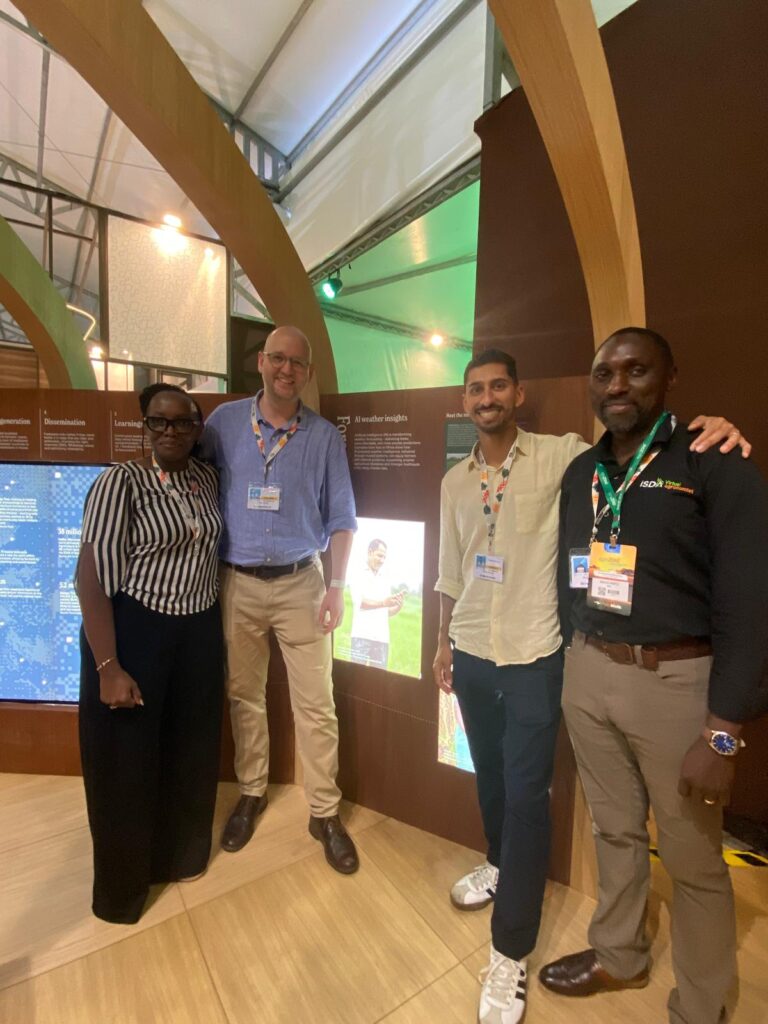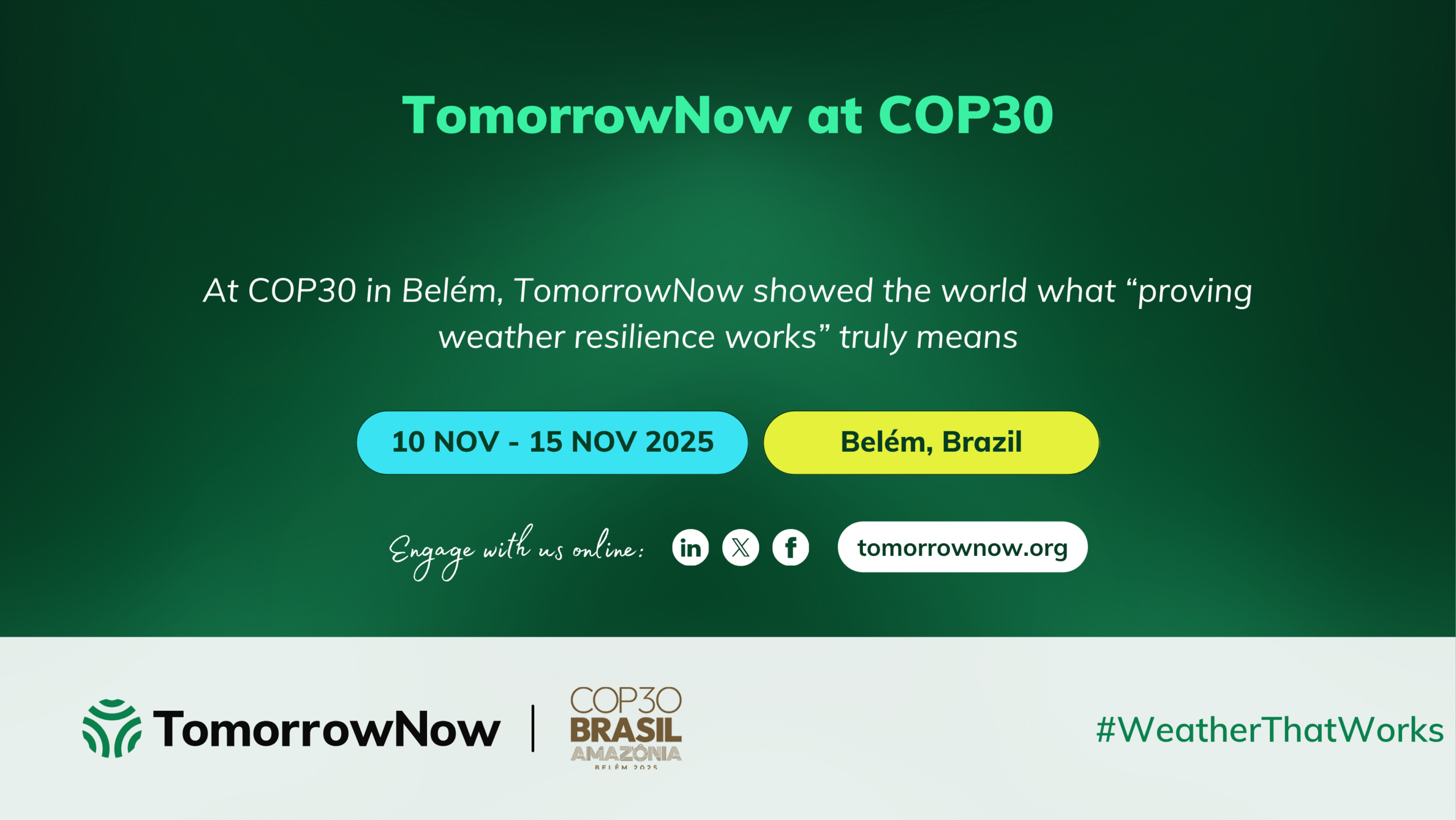Belém, Brazil – This year’s UN Climate Change Conference — COP30 in Belém, Brazil — comes at a defining moment. As governments work to update their national climate commitments (NDCs) and negotiate a new global roadmap for adaptation and finance, the world’s most vulnerable communities are already living the realities of climate change.
For smallholder farmers across Africa, rains come late — or not at all — and when they do, they can wash away weeks of preparation. Yet while the weather grows more unpredictable, most farmers still rely on forecasts that are too generic, too late, or too far from reality.
That’s the gap TomorrowNow is closing — turning climate data into trusted, actionable guidance that farmers can actually use, every single season. Our presence at COP30 matters because we didn’t arrive to make promises — we came to show proof. While policymakers debated future goals, TomorrowNow demonstrated how African-led, science-driven innovation is already transforming lives on the ground.
We must keep prioritizing farmer voices from day one. Their insights — about timing, trust, access, and language — should shape the tools we build and how we deliver them.
For our solutions to drive real behavior change, they must fit seamlessly into how farmers already make decisions.
“Agriculture Is Where Climate Meets Humanity”
At the Innovation Showcase, TomorrowNow’s Wanjeri Mbugua captured the urgency — and hope — of the moment:
“Agriculture is where climate meets humanity. And nowhere is that intersection more visible — or more fragile — than on Africa’s smallholder farms. These are not just producers; they are stewards of resilience, adaptation, and hope.”
TomorrowNow’s agro-met intelligence — the bridge between climate data and crop decisions — is designed precisely for these farmers. It translates cutting-edge science into localized agronomic advice: weather information farmers can act on, not just access. Through partnerships with the University of Reading, One Acre Fund, and national meteorological agencies, TomorrowNow has proven that when weather data is made practical, everything changes. In Kenya, we’ve reached 5.2 million farmers — half of them women — and seen yield increases of 12 percent.
As one farmer, Euphrasia Masai, told us:
“The messages tell me exactly what to do — last week it warned of too much rain, so I dug drainages in my maize field. Before, I relied only on tradition — now I see how these advisories protect my harvest.”
Her words reflect the heart of TomorrowNow’s mission: turning data into action, and action into dignity.

Proof, Not Pilots
Across COP30, TomorrowNow emphasizes that climate resilience works best when built on proof, not pilots. Every data point and farmer story reinforces a simple truth — weather-informed farming is not just possible, it’s profitable. In Kenya, 98% of farmers in our pilot confirmed receiving SMS forecasts, 88% understood the messages clearly, and 72% recommended them to peers.
The average delivery cost? Just $0.56 per farmer — among the most cost-effective interventions ever measured by One Acre Fund.
And this isn’t isolated impact. Through partnerships with KALRO in Kenya, NiMET in Nigeria, and Zambia Meteorological Department, TomorrowNow is embedding weather intelligence into public systems — ensuring services last beyond donor cycles and strengthening the institutions farmers already trust.
“Technology alone doesn’t deliver resilience — systems do,” Wanjeri reminded the audience. “That’s why we work hand-in-hand with governments and partners, to build climate-smart infrastructure that lasts.”
Collaboration That Scales
At the TomorrowNow and iSDA Virtual Agronomist side event, two Gates-supported innovators came together to showcase “two sides of one solution” — AI for weather and AI for soil. The panel highlighted how combining TomorrowNow’s agro-met intelligence with iSDA’s soil data can accelerate productivity, improve incomes, and build climate-ready systems across Africa.
Together with the Gates Foundation, CGIAR, and Embrapa, TomorrowNow is helping shape a new generation of digital public infrastructure — where validated science and farmer-centered delivery come together to scale what works.

From Fields to Policy
TomorrowNow’s work represents exactly what COP30 is striving for: turning science and innovation into policy and systems that last. As Wanjeri closed her remarks at the Showcase, she left delegates with a challenge:
“The question is not whether we can build resilience — but how bold we’ll be in turning proof into policy, and pilots into systems that last.”
That’s what TomorrowNow stands for — the confidence to move beyond small-scale success and the evidence to guide large-scale change.
The Road Ahead
Week one of COP30 proved that Africa’s climate leadership is already here. TomorrowNow’s approach — validated, scalable, and system-embedded — is helping redefine what effective adaptation looks like. As global negotiators shape the next phase of the Paris Agreement, TomorrowNow’s results show what’s possible when innovation meets implementation.
We’re not just forecasting resilience — we’re delivering it.
From forecasts to fields, from data to resilience — this is #WeatherThatWorks.

